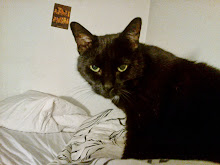This week's Project Runway task was to redesign the look of The Sheep Dogs. If you've watched the show, you know two things right off the bat:
-the designers don't know how to make menswear, and
-there's always an issue about "big" clients.
I like this show, even if I don't care for fashion, even if I sometimes skip the "real people" challenges because of my own body dysmorphia. It's just hurtful to see people half my size called "huge" and designers act like making clothes for them is a joke.
This time, it was extra weird, because Olivier is a menswear designer, but he acted like he can't possibly cope, because got the "big" lead singer Ewan. Now, in my eyes, Ewan is a bit chubby but by no means HUGE. Olivier, however, was completely freaked out about how BIG Ewan is and how he can't design for big people. I'll stop here to remark that even if Ewan were huge compared to most people, that would still not excuse Olivier's attitude. But Olivier's reaction speaks volumes of how he views the human body. He's Asian and very small himself, so perhaps that plays into it, but he obviously isn't even used to averagely chubby people. Last week, he complained about his client's breasts - D cup, which apparently he had never heard of - and wanted to hide them, when the client wanted to accentuate them. He obviously doesn't realize that some "big" people like showing off their body. It's ignorance rather than meanness, I think; Olivier is kind of cute and hapless and surely has no intention of offending anybody, he's just hugely body dysmorphic or something.
It's a bit vindicating that Olivier ended up going home, but not before he said twice in front of the client that "he's much bigger than the mannequin", then interviewed that "you don't have the same kind of passion, I never thought I'd be designing for plus size people".
WTF, Olivier? Aren't clothes your passion? Like material, design, pattern? Couldn't you just make a really cool rock star outfit in a slightly bigger size? Is designing for bigger people suddenly such a bummer that you can't feel anything? This felt very othering and dehumanizing. Some designers from previous seasons have acted the same way. There's always a "real people" challenge and there's always someone who acts like plus sizes are something from another planet. They obviously don't realize that some viewers are plus size and enjoy wearing nice clothes. And instead of broadening their horizons or going "OK, I can really do something good here and bedazzle the judges with my mad skillz", they just throw their arms up: "No one could do this!"
The weirdest thing is that Olivier doesn't mind saying all this out loud, completely honestly, even to the client. He has no subtlety or politeness about it, and yet he seems like he doesn't want to offend. It's like he thinks BIG people just have to take it, and how could they not realize they're so big. But Ewan, when he asked, "Are you saying I'm a big guy?" looked hurt and embarrassed. (Maybe I'm projecting, because that's how I would have felt.) The always cool Tim Gunn just stared at Olivier with a disapproving frown. He didn't say "That's no way to talk to your client", but he obviously tried to signal that with his eyes. Olivier didn't get it.
Interestingly, judge Michael Kors pointed out that Olivier has a 6'3'' client and he manages to shrink this guy, rather than make him look big and mighty. Olivier obviously thinks that anything big is bad, even tall is bad. (Aren't the models tall? Where is this all coming from?) You'd think a lead singer in a rock band may want to look big, like he's the star, and some people like big men. In fact, you might argue that a short and thin man gets more body criticism because he's "effeminate". A big and fat man is at least masculine in the size. Or that's what I hear.
I felt really bad for Ewan. He was supposed to get a cool new look for his rock star self, and he gets endless references to his weight instead. I don't know how he feels about his weight; some guys aren't that bothered about it, but I wouldn't blame him for feeling really body dysmorphic after this. At least his other designer, Bert, gave him an outfit that made him look more rock'n'roll. Bert wasn't shy about dressing a big man, but then he is fat himself (much bigger than Ewan, of course). The perfect antidote to Olivier.
You know what I'd like to see? A whole season with plus size models. Or a whole season of "real" clients, one after the other. Fat people, old people, children's wear. Something that would totally knock the designers off their balance and make them do their best work or go up in flames.
Bottom line: It's not the client's fault if he's bigger than the mannequin. That's not your excuse to not even try. Learn to make clothes for big people, and to see big people as people in the first place. You can't live your whole life in a bubble with models.
Sad and Tired
14 years ago









